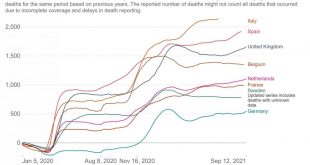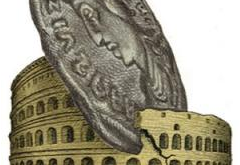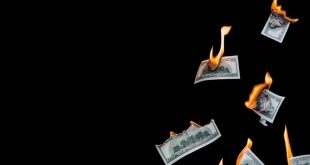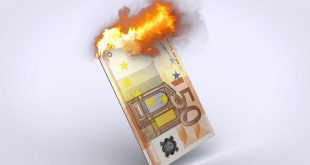On September 6, 2021, the city-state of Berlin, Germany’s capital, held a referendum: voters in Berlin had to decide whether thousands of housing units owned by “large real estate firms” should be nationalized. 56.4 percent voted yes, 39 percent no. While the referendum is not binding, it forces Berlin’s incoming city government to debate the expropriation measure. However, whichever way you look at it, it certainly is an expropriation attempt: the term...
Read More »Without Lockdowns, Sweden Had Fewer Excess Deaths Than Most of Europe
It’s now been more than eighteen months since governments began the new social experiment now known as “lockdowns.” Prior to 2020, forced “social distancing” was generally considered to be too costly in societal terms to justify such a risky experiment. Yet in 2020, led by health technocrats at the World Health Organization, nearly all national governments in the world suddenly and without precedent embraced the idea of lockdowns. On the other hand, the Swedish...
Read More »Currency Debasement and Social Collapse
Knowledge of the effects of government interference with market prices makes us comprehend the economic causes of a momentous historical event, the decline of ancient civilization. It may be left undecided whether or not it is correct to call the economic organization of the Roman Empire capitalism. At any rate it is certain that the Roman Empire in the 2nd century, the age of the Antonines, the “good” emperors, had reached a high stage of the social division of...
Read More »Yes, the US Government Has Defaulted Before
The regime is trying to whip up maximum hysteria or the chances that the US government could default on its debts if the debt ceiling is not raised. So far, the financial markets don’t seem to care that much, as ten-year Treasurys over the past week have barely risen above 1.5 percent, and not even matched last March’s recent high. Investors seem pretty confident that the world will still exist, even after default. But the media and Democratic politicians assure us...
Read More »Monetary Competition: The Best Alternative to Razing Central Banks to the Ground
[Editor’s note: Two interviews from August 1992, given by Murray Rothbard to the Swedish student publication Svensk Linje (continuously published since 1942) were recently discovered in the Rothbard Archives and translated by Sven Thommesen for the first time. In this interview, Anton Wahlman, an economist from Georgetown University School of Foreign Service, interviewed Rothbard about Sweden and European integration with the rise of the ECU (euro). The interview...
Read More »The 1787 Constitution Was a Radical Assault on the Spirit of the Revolution
It was a bloodless coup d’état against an unresisting Confederation Congress. The original structure of the new Constitution was now complete. The Federalists, by use of propaganda, chicanery, fraud, malapportionment of delegates, blackmail threats of secession, and even coercive laws, had managed to sustain enough delegates to defy the wishes of the majority of the American people and create a new Constitution. The drive was managed by a corps of brilliant members...
Read More »Middle of the Road Leads to Socialism: An Online Seminar with Dr. Robert Murphy
This is a special virtual seminar for donors to our fall campaign. Donate Today! On Friday, October 8, at 2:00 p.m. CDT, Jeff Deist and Bob Murphy will discuss Mises’s views on interventionism and their continued relevance today, particularly after the last year and a half of economic intervention resulting from covid tyranny. “[Interventionism] preserves some of the labels and the outward appearance of capitalism. It maintains, seemingly and nominally, private...
Read More »Why Everyone Should Read These Two Essays by Ludwig von Mises
Like virtually all of the work of Ludwig von Mises, these two essays, his 1958 Liberty and Property and his 1950 Middle-of-the-Road Policy Leads to Socialism are timeless. They are as important now as they have ever been and will increase in relevance as the growth of government continues almost unabated. The growth of government constitutes an assault on private property and individual freedom by politicians, bureaucrats, and interest groups who seek to keep for...
Read More »Is Self-Ownership Necessary?
Isn’t a principle of nonaggression against others another way of stating the self-ownership principle? “Not necessarily,” says the insightful philosopher Chandran Kukathas. Original Article: “Is Self-Ownership Necessary?” Chandran Kukathas is one of the best contemporary political philosophers, and one of the few sympathetic to libertarian views. Unlike Murray Rothbard, he does not consider self-ownership fundamental but instead defends libertarianism from a...
Read More »Why the Federalists Hated the Bill of Rights
The Constitution had been ratified and was going into effect, and the next great question before the country was the spate of amendments which the Federalists had reluctantly agreed to recommend at the state conventions. Would they, as Madison and the other Federalists wanted, be quietly forgotten? The Antifederalists, particularly in Virginia and New York, would not permit that to happen and the second convention movement, led by Patrick Henry and George Mason in...
Read More » Swiss Economicblogs.org
Swiss Economicblogs.org










